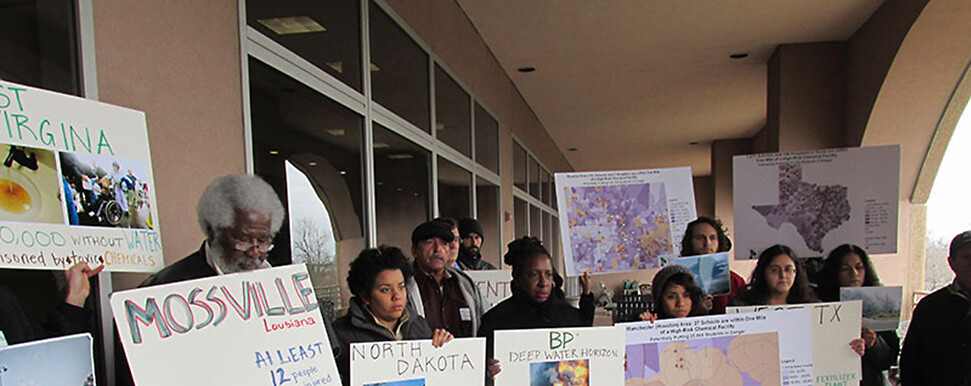
Media
February 27, 201725 EJ Groups Urge Congress: Don't Meddle with Chemical Plant Safety Improvements
Groups Say Congress will be Blamed if New Safety Updates are Blocked and Disaster Strikes
Contact:
Michele Roberts, National Co-Coordinator of the Environmental Justice Health Alliance, (202) 704-7593,mroberts@comingcleaninc.org
Eboni Cochran, Co-Coordinator of Rubbertown Emergency Action, (502) 551-4734, rubbertownstinks@gmail.com
Eric Whalen, Communications Coordinator with Coming Clean, (971) 998-8786, ericwhalen@comingcleaninc.org
[Washington, D.C.] – Last week, the Environmental Justice Health Alliance (EJHA) sent a letter to Senate Majority Leader Mitch McConnell, Speaker of the House Paul Ryan, and other Congressional leaders urging them to block efforts to overturn improvements to the Environmental Protection Agency's (EPA) Risk Management Plan (RMP). The letter was signed by executives from 25 groups which focus on environmental justice issues, and included many organizations who work with or represent community members living in the disaster-zone of catastrophic explosions or dangerous chemical releases from facilities covered by EPA’s RMP.
In a process initiated after the 2013 West, TX fertilizer plant disaster, EPA recently finalized updates to its RMP program after a several-year, multi-agency effort. EPA’s extensive process included nearly 150,000 public comments and eight listening sessions—which overwhelmingly demonstrated public support for stronger chemical disaster prevention measures at facilities across the nation. Despite this effort, in January, 2017, Representative Mullin of Oklahoma introduced House Joint Resolution 59, which would block these safety improvements under the Congressional Review Act (CRA). If passed, this measure would also bar EPA from issuing any substantially similar safety measures until directed by Congress.
Michele Roberts, Co-Coordinator of EJHA said, “After years of struggling to get stronger protections for families that live in the immediate blast zone or disaster path of chemical facilities, some members of Congress are now trying to not only block improvements to our safety, but also to prevent stronger protections from disasters for years to come. If Congress allows these chemical safety improvements to be blocked they may end up being blamed the next time disaster strikes and Americans lose their lives.”
Eboni Cochran, Co-Coordinator of Rubbertown Emergency Action (REACT) in Louisville, KY, said, “As someone who lives within a community vulnerable to chemical plant explosions, I find it reprehensible that people charged with making decisions that affect our daily lives would choose to place us in greater danger. We have to deal with long term exposures to toxic chemicals and the threat of explosions from chemical plants and rail cars. To add insult to injury, there is currently no evacuation plan that has been communicated to us, leaving us even more vulnerable and potentially causing greater chaos in the event of a disaster. We need courageous leaders who will see each and every decision through the lens of the safety and well being of their constituents.”
Some communities bear disproportionate risk associated with chemical disasters. A demographic analysis found that people of color and low-income communities are more often located near hazardous chemical facilities. The analysis found that the percentage of Blacks and Latinos living near hazardous chemical facilities is 75% and 60% greater (respectively) than for the background average of the U.S. as a whole. The poverty rate near hazardous chemical facilities is 50% higher than the rest of the nation.
Improving our nation’s chemical safety rules is widely popular across political leanings, and over 40,000 people have urged EPA to strengthen its RMP program even beyond these current steps. Despite this, industry has been calling on the incoming Trump administration and Congress to block or repeal these updated safety improvements.
###
The Environmental Justice Health Alliance (EJHA) organizes industry reform strategies for safer chemicals and clean energy that leave no community or worker behind. Find more about EJHA here: http://ej4all.org/.
